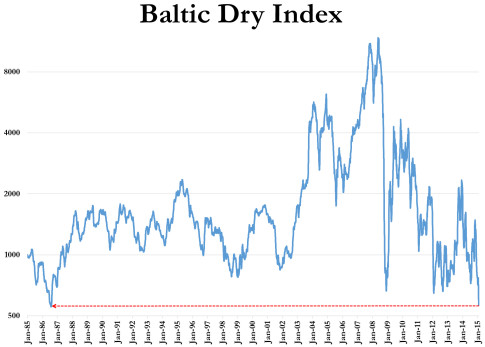– Bulk Shipping Bankruptices Begin As Baltic Dry Collapse Continues (ZeroHedge, Feb 5, 2015):
With one of the world’s leading dry bulk shipping companies, Copenhagen-based D/S Norden, having made huge losses for the last 2 years and expected to report dramatic losses in 2014 also, it is hardly surprising that the smaller bulk shipping firms are struggling as The Baltic Dry Index collapses ever closer to record all-time lows. As Reuters reports, privately-owned shipping company Copenship has filed for bankruptcy in Copenhagen after losses in the dry bulk market, with the CEO exclaiming, “we have reached a point where there is not more to do.” We suspect, given the crash in shipping fees, that this is the first of many…
On Thursday the index stood at 564, close to the historic low level of 554 set in July 1986.
Privately-owned shipping company Copenship has filed for bankruptcy in Copenhagen after losses in the dry bulk market, its Chief Executive Michael Fenger told Reuters.
Copenship had been operating over 50 chartered small-sized dry-bulk vessels carrying goods such as grain, iron ore and timber.
“We have done what we could to raise the funds to save the company, but we have reached a point where there is not more to do,” Michael Fenger wrote in a text message to Reuters on Wednesday.
The Baltic Exchange’s main sea freight index, which tracks rates for ships carrying dry bulk commodities, fell to its lowest level in nearly three decades on Tuesday, hurt by weaker rates across all four vessel segments.
…
“First of all, we have found ourselves in an extremely bad dry cargo market. Secondly, there are several counterparties that have caused us losses, and then thirdly there are different insurance cases that could hit us,” Fenger wrote.
Insolvency administrator Per Astrup Madsen from Copenhagen law firm Lett said the vessels will be handed back to owners.
“Copenship expected to turn around the business in 2014 but the dry bulk freight rates continued the falling trend,” Astrup Madsen said.
One of the world’s leading dry bulk shipping companies, Copenhagen-based D/S Norden, posted a net loss of $326 million for 2012 and 2013 combined, and said in December it expects a full-year 2014 EBITDA loss of between $290 million and $230 million.
* * *
Shipping analyst Peter Sand at shipping organisation Bimco said 2015 looks set to be dull on the demand side, whereas the supply side is likely to provide the same amount of new capacity as in 2014. “Such a development will not improve the fundamental market balance,” he wrote in a note.

I am sorry for the workers and the smaller companies being harshly affected by this world economic implosion that is occurring. Of course, it is affecting the west far more than the rest of the nations, far too long has consumption outweighed need, but that is finally changing.
As incomes continue to buy less food (prices of food and decent drinking water are going up every day), people buy less of everything. Food insecurity, even among those who are not yet suffering food shortages, makes people conserve cash and spend less. It sets up a mentality of depression that can take generations to change.
People learn to make do with less, and here in the west, there is a lot of room for that. Prices, except for food and shelter are going down, and people are waiting for them to go lower. My father often talked of it, he never got rid of it, and he died in 1997.
Everything from food, clothing, furniture………people learn to conserve. Some of us use furniture that belonged to our ancestors, but we are in the minority. Many want new furniture every few years…..but that is changing, they are putting off their spending. That is deadly for an economy that relies so much on consumer spending. They claimed consumer spending made up 70% of our economy, but that is questionable. When good jobs continue to melt away in the millions, people start conserving until they stop altogether. I wonder how much was really spent at Christmas vs: how much was put on the credit card…..?